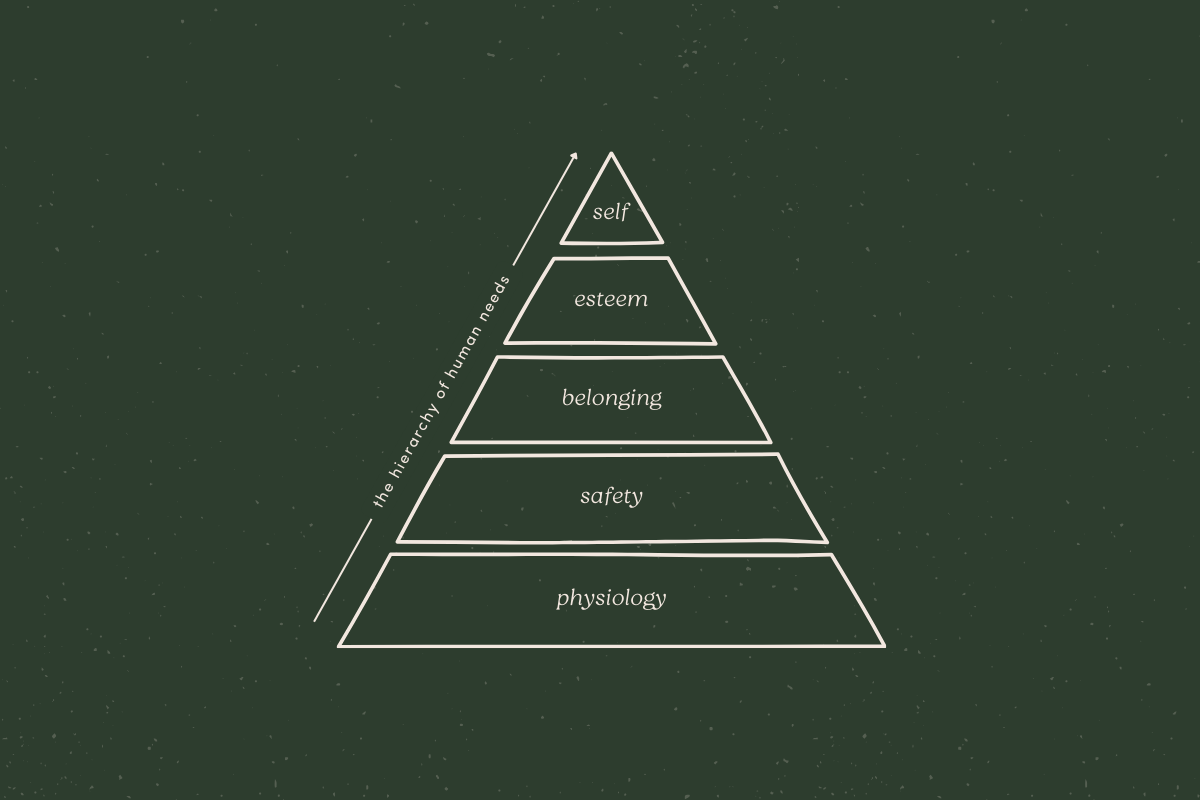Bubble baths. Manicures. Face masks. Yoga classes. These are some of the activities that may come to mind when we think of the word “self-care”, a term that has taken over the internet in the past few years. A quick search for #selfcare on Instagram reveals over 45 million posts.
Don’t get me wrong, there’s nothing wrong with pampering yourself on a Sunday night. Self-care is fundamentally important and one of the pillars of the Slow Self brand. However, the way many people and companies describe and understand self-care fails to take into account the full spectrum of human needs. In fact, it oftentimes barely scratches the surface.
This limited view of self-care can sometimes lead to us putting bandaids on problems that need different solutions. That’s why in this article I would like to go deeper and suggest a more complex interpretation of self-care. One that addresses all the ways in which we can (and must) take care of ourselves.
The hierarchy of human needs
So what exactly do we need as humans, to be happy and fulfilled? If you’ve ever followed a Psychology course, you may be familiar with Maslow’s hierarchy of human needs. According to this theory, human needs can be depicted as a pyramid consisting of 5 levels: physiological needs, safety needs, love and belonging needs, esteem needs, and self-actualization needs. Only once the basic needs lower down in the hierarchy are met, can we move onto more complex needs.
- Physiological: Are my basic needs met?
- Safety: Do I feel safe and in control?
- Belonging: Do I feel connected?
- Esteem: Do I feel confident?
- Self-Actualization: Am I the best version of myself?
The hierarchy of human needs offers a useful framework for creating a more complete picture of self-care, and figuring out which areas may need more attention. Let’s have a look at how we can take care of ourselves in ways that meet all of our different needs.
Are my basic needs met?
The first level of the pyramid represents our physiological needs – in other words, the biological requirements for human survival. Think air, food, water, shelter, warmth, sleep… If these needs aren’t met, we cannot function optimally.
When it comes to physiological care, we may ask ourselves questions like:
- Am I getting enough good-quality sleep?
- Am I eating a varied, nourishing diet?
- Am I drinking enough water every day?
- Do I get enough fresh air?
- Am I moving my body regularly in a way that feels good?
Although all these things are obviously vitally important, most interpretations of self-care start and end with taking care of our bodies. Let’s take it a step further.
Do I feel safe and in control?
Once our bodies are functioning properly, our need for security and safety becomes relevant. This brings us to the second level: safety needs. As humans, we want to experience order, predictability and control in our lives. When we don’t, this can lead to feelings of anxiety and overwhelm.
Here are a few questions we might ask to figure out if our safety needs are being met:
- Am I feeling safe in my home and neighborhood?
- Am I feeling financially secure?
- Do I have good access to health care?
- Do I have access to resources to help me take care of my mental health?
- Does my life feel grounded?
- Do I have rituals that bring stability to my life?
- Do I have activities and people I can fall back on when things get overwhelming?
Taking care of our safety needs isn’t as sexy as sheet masks or pilates, but sometimes making a budgeting plan or switching to a new doctor is a much more impactful way of taking care of yourself in the long run.
Do I feel connected?
After our bodies are taken care of and we feel safe, the next level is our need for belonging. Humans are social beings, and the quality of our social lives is one of the most important influences on our mental and physical health.
Here are some questions we might ask to assess our interpersonal relationships and sense of belonging:
- Do I have close friends who I can rely on?
- Do I have a someone who I can confide in about problems I’m facing?
- Do I feel accepted for who I am by those surrounding me?
- Are my relationships healthy and balanced?
- Do I spend enough quality time with my friends/family/partner?
- Am I feeling fulfilled in my sex life?
- Do I have good relationships with my work colleagues?
We all have different temperaments and a rich social life looks different for everyone, but it never hurts to be a bit more intentional about making sure our social needs are met.
Do I feel confident?
The fourth level of Maslow’s hierarchy represents esteem needs. We all share a need to feel that we are valued and that we are making a contribution to the world. We seek recognition from others, but also from ourselves. Here are a few questions to reflect on:
- Am I doing work that suits me and leverages my qualities?
- When did I last feel empowered?
- Do I have hobbies that help me build my skills?
- When was the last time I celebrated my wins?
- Am I slowly making progress towards my ambitions?
- How am I making a positive contribution to the world?
Whether it’s work, academic achievements, sports, helping others, or a personal hobby – these things can all help you build confidence and fulfill your esteem needs.
Am I the best version of myself?
Now we arrive at the very last part of the pyramid: self-actualization needs. Self-actualization refers to the realization of one’s potential. We all have a desire to grow into the best version of ourselves. If you’re on this site, I’m guessing that’s something you think about quite a lot.
It’s easy to use typical self-care activities as an excuse to stop working on our personal growth. However, embracing a multi-level definition of self-care means recognizing that sometimes what we feel like doing in the moment isn’t what’s best for us in the long term.
Self-care is also about understanding patterns in our behavior that are keeping us from moving forward, and proactively working towards shifting them. There’s absolutely nothing wrong with watching Netflix for 3 hours, if that’s what you need to mentally recharge. But if you’re using that time as a distraction to avoid actions that will benefit you, can we truly call it self-care? If self-care means prioritizing ourselves, shouldn’t that also include our future selves?
In order to figure out if your self-care practices extend to this fifth and ultimate level, here are a few questions to ponder:
- How am I doing on the goals I set for myself?
- Do I have a sense of purpose?
- Are there any habits that are holding me back right now?
- When did I last get out of my comfort zone?
- Am I intentionally choosing the direction of my life?
- Do I regularly spend time reflecting on my life?
- When have I last expressed myself creatively?
- When was the last time I had a truly memorable, fulfilling experience?
- Does my physical environment support me in becoming the person I want to be?
Practicing true self-care
Now that we have a better idea of the different levels of self-care, how do we make sure we’re practicing true self-care on a consistent basis? Ensuring all our needs are getting attention often requires a bit of intentional planning. Meeting your physiological needs may look like scheduling exercise, meal prepping, tracking your water intake or avoiding screen time right before bed.
Addressing your safety needs might mean you’re reviewing your finances on a weekly basis and staying on top of your (mental) health appointments. You might also experiment with different morning and evening routines, to establish more order and calm in your life.
Taking care of your need for belonging could look like scheduling meet ups, adventures, calls and date nights with the people you care about, before all your time gets sucked up by other responsibilities. By making social activities part of your weekly or monthly planning, you will always have something fun to look forward to.
You might nurture your self-esteem through journaling, positive affirmations, experimenting with different hobbies, honing in on your qualities and taking on new opportunities. If you’re a great cook, throw more dinner parties! If you’re good at writing, why not start a blog?
A great way to address your self-actualization needs is to create a vision for your life and set goals that are aligned with that vision. By reviewing those goals and scheduling concrete actions as a part of your planning process, you can consistently move towards being the best version of you.
Pro tip: if you want to make sure you’re staying mindful of all the different facets of self-care, using a trigger list can be really helpful. Inspired by the Getting Things Done method, these lists help remind you of the things you may need or want to do to stay well and on top of your life. I keep my trigger list in Notion (template here), and like to use it whenever I plan my week.
~~~
By embracing these different categories of self-care, it becomes easier to pin-point which areas may need some attention whenever you’re feeling a little meh. This in turn will help you show up for yourself in the ways that will be the most impactful.





